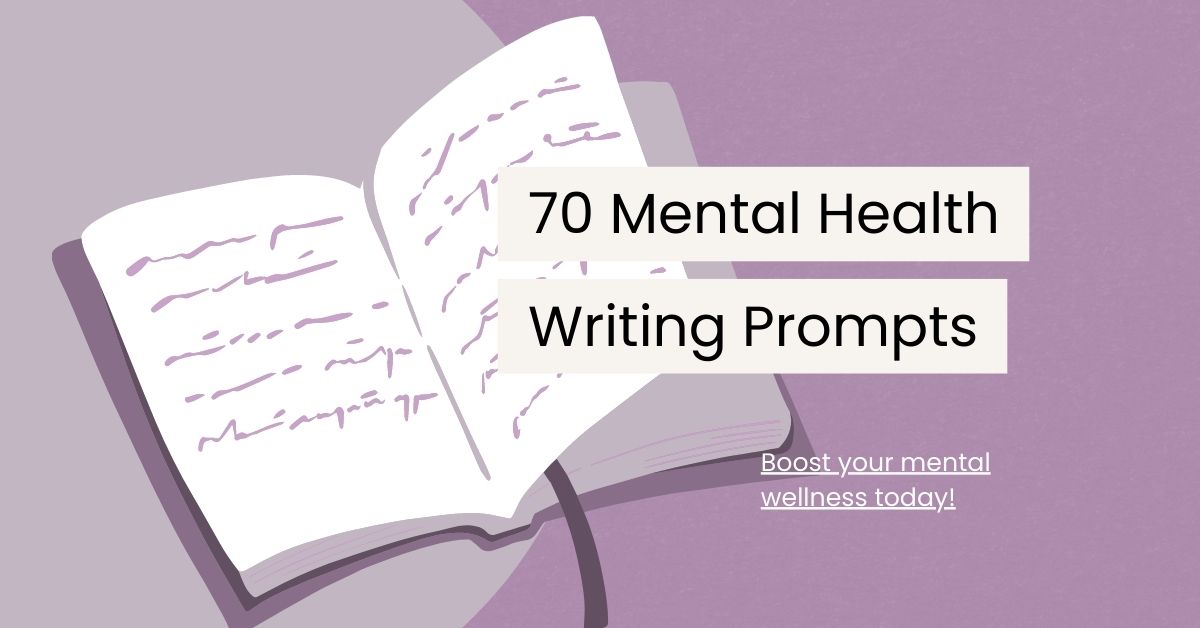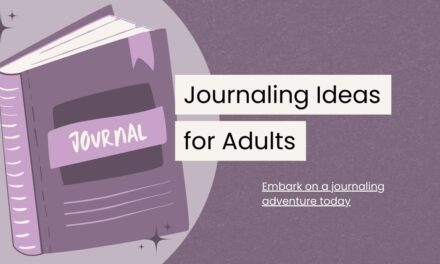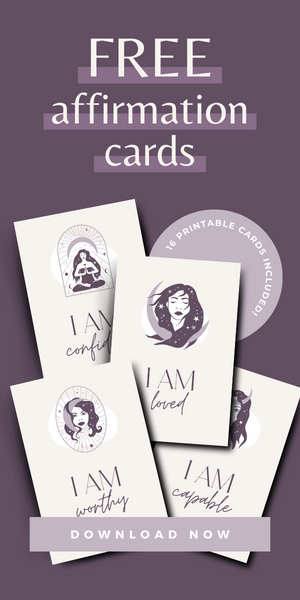Last Updated on October 3, 2023
Today, I want to dive into something we all deal with but don’t often discuss openly enough: our mental health. Yep, that’s right, those thoughts and feelings that swirl around in our heads all day, every day.
Now, don’t worry, I’m not here to delve into deep psychology or prescribe solutions. Instead, I want to invite you on a journey of self-reflection and exploration.
You see, I’ve put together a list of 70 thought-provoking mental health writing prompts that will help you gain clarity, reduce stress, and foster a deeper understanding of yourself.
So, if you’re up for some self-discovery and personal growth, stick around.
Let’s embark on this journey together, one question at a time.
Ready? Let’s get started!
List of Mental Health Writing Prompts for Self-Reflection
Mental Health Writing Prompts for Exploring Your Emotions
- Describe a moment when you felt an overwhelming mix of conflicting emotions. How did you navigate through them and what did you learn from the experience?
- Reflect on a time when you suppressed your emotions to protect others or maintain a facade. How did it impact your mental well-being, and what can you do differently in the future?
- Write about an emotion you find difficult to express openly. What do you think is holding you back, and how can you work towards being more emotionally authentic?
- Reflect on a situation that evoked a deep sense of gratitude within you. How did expressing gratitude impact your overall well-being and perspective on life?
- Describe a time when you experienced a sense of emotional numbness or detachment. What may have caused these feelings, and how can you reconnect with your emotions?
- Recall a situation where you experienced profound sadness or grief. How did you cope with these emotions, and how has the experience shaped your perspective on life?
- Write about a moment when you felt overwhelmed by fear or anxiety. How did you manage these emotions, and what strategies can you employ to better cope with future instances?
- Describe a moment of intense anger or frustration. How did you channel or release these emotions in a healthy manner, and what did it teach you about emotional regulation?
- Reflect on a time when you felt a deep sense of compassion or empathy towards someone else’s struggles. How did this emotional connection impact your well-being and relationships?
- Recall a time when you experienced a profound sense of joy or happiness. What factors contributed to this emotional state, and how can you cultivate more of it in your life?
Mental Health Writing Prompts for Self-Discovery and Identity
- Discuss a life-changing event that shaped your sense of self and identity. How did this event influence your beliefs, values, or aspirations?
- Reflect on a time when you confronted and overcame a significant personal fear or insecurity. How did this experience transform your perception of yourself?
- Write about a role model or mentor who has had a profound impact on your self-discovery journey. What lessons or qualities do you admire in them, and how have they inspired your growth?
- Describe a moment when you found the courage to embrace your authentic self despite societal pressures or expectations. How did this decision affect your mental well-being?
- Discuss a belief or thought pattern that has limited your personal growth. How can you challenge or change this belief to foster a more positive self-identity?
- Reflect on a past mistake or failure that still affects your self-esteem. How can you practice self-compassion and forgiveness to heal and move forward?
- Write about a moment when you felt imposter syndrome or a lack of self-worth. How can you reframe your mindset to recognize your true value and capabilities?
- Describe a quality or talent that you undervalue or haven’t fully embraced. How can acknowledging and celebrating this aspect of yourself improve your mental well-being?
- Discuss a time when societal expectations or external pressures conflicted with your authentic self. How can you honor your true identity while navigating external influences?
- Reflect on a personal journey of self-discovery. What have you learned about yourself, and how has this knowledge impacted your mental health and relationships?
Prompts for Relationships and Communication
- Write about a past relationship that was emotionally draining or toxic. What warning signs did you miss, and what lessons can you apply to future connections?
- Reflect on a time when effective communication resolved a conflict or strengthened a relationship. How can you cultivate better communication habits to improve your mental well-being?
- Describe a situation where you felt unheard or invalidated by someone close to you. How can you assert your needs and emotions while maintaining the relationship?
- Discuss a relationship that you’ve outgrown but have been hesitant to let go of. How can you navigate the process of setting boundaries and prioritizing your well-being?
- Reflect on a moment when you deeply connected with someone through vulnerability and openness. How can you foster more meaningful connections in your life?
- Write about a relationship dynamic that triggers negative emotions or patterns. How can you address these triggers to promote healthier interactions and emotional growth?
- Write about a conflict or disagreement that you resolved through effective communication and empathy. How did active listening and understanding contribute to the resolution?
- Reflect on a time when you struggled with setting healthy boundaries in a relationship. How did this impact your well-being, and what steps can you take to establish and maintain boundaries moving forward?
- Describe a relationship where you experienced a deep sense of trust and emotional safety. How did this bond enhance your mental well-being, and what qualities contributed to its strength?
- Discuss a situation where you found it challenging to express your needs or emotions to a loved one. How can you improve your assertiveness and open communication in similar circumstances?
Writing Prompts for Coping Strategies and Self-Care
- Reflect on a time when you felt overwhelmed by stress or burnout. What self-care practices did you engage in to restore your well-being, and how can you prioritize self-care proactively?
- Write about a creative outlet that brings you joy and helps you manage stress. How can you integrate more of this creative practice into your daily life?
- Discuss a self-soothing technique or ritual that brings you comfort during difficult times. How does it contribute to your emotional well-being and resilience?
- Reflect on a time when you leaned on your support system for emotional support. How did reaching out for help positively impact your mental health and coping mechanisms?
- Describe a coping mechanism that has been your go-to during difficult times. How effective is it in the long term, and are there healthier alternatives you could explore?
- Reflect on a time when self-care felt like an act of resistance against a stressful or demanding environment. How can you prioritize self-care even in challenging circumstances?
- Write about a coping strategy you wish to develop or improve. How can you incorporate it into your daily routine and measure its impact on your mental well-being?
- Discuss a time when you used creative expression (art, writing, music, etc.) to cope with emotional distress. How did it influence your healing process, and how can you further integrate creativity into your life?
- Reflect on a self-care practice that allows you to reconnect with nature and find solace. How does this connection with the natural world contribute to your mental health?
- Describe a moment when you resisted seeking support or professional help. What barriers prevented you from reaching out, and how can you overcome them to prioritize your mental well-being?
Writing Prompts for Growth and Resilience
- Write about a setback or failure that felt insurmountable at the time. How did you find the strength to persevere, and what did you learn from the experience?
- Reflect on a fear or insecurity that has held you back from pursuing your goals. How can you reframe your mindset to approach these challenges with resilience and courage?
- Describe a time when you felt lost or uncertain about your purpose. How can you explore and align your passions with your mental well-being and personal growth?
- Discuss a significant change or transition in your life that forced you to adapt. How did you navigate the uncertainty, and what positive outcomes emerged from this transformation?
- Reflect on a time when you received constructive criticism or feedback. How did you respond to it, and how did it contribute to your personal and professional development?
- Write about a difficult decision you had to make that ultimately led to personal growth. How did you navigate the decision-making process, and what lessons did you learn along the way?
- Write about a personal accomplishment that made you feel proud and resilient. How did this achievement contribute to your personal growth and self-belief?
- Reflect on a time when you faced a major life obstacle or adversity. How did you navigate through it, and what strengths or skills did you discover in the process?
- Describe a moment when you stepped outside of your comfort zone and embraced a new experience or opportunity. How did this act of bravery contribute to your personal growth?
- Discuss a situation where you practiced self-compassion and forgiveness towards yourself. How did these acts of kindness support your resilience and emotional well-being?
Mental Health Writing Prompts for Setting Boundaries
- Reflect on a situation where you felt your boundaries were crossed or violated. How did it impact your well-being, and what steps can you take to establish and communicate your boundaries more effectively?
- Write about a relationship or interaction where you struggle to set boundaries. What fears or beliefs hold you back, and how can you work on overcoming them to prioritize your emotional and mental well-being?
- Describe a time when you compromised your boundaries to please others. How did it affect your sense of self and overall happiness? What strategies can you employ to honor your boundaries while maintaining healthy relationships?
- Discuss a boundary you wish to set with yourself in terms of self-care or personal commitments. What obstacles might you encounter, and how can you stay committed to honoring that boundary?
- Reflect on a situation where you allowed guilt or obligation to override your boundaries. How can you cultivate a sense of assertiveness and self-respect to navigate similar circumstances in the future?
- Write about a boundary-setting challenge in a professional setting. How can you effectively communicate your limits and expectations to maintain a healthy work-life balance?
- Describe a time when you had difficulty saying “no” to someone. How can you practice assertiveness and establish firm boundaries without feeling guilty or obligated to meet others’ demands?
- Reflect on a pattern of people-pleasing or codependency that has hindered your ability to set boundaries. How can you cultivate self-worth and prioritize your needs while maintaining healthy relationships?
- Write about a boundary you have successfully set and how it positively impacted your well-being. What lessons did you learn from that experience, and how can you apply them to future boundary-setting situations?
- Discuss a boundary-related fear or concern that you need to address to establish healthier boundaries. What steps can you take to build confidence and resilience in setting and maintaining boundaries?
Mental Health Writing Prompts for Stress Management
- Reflect on a recent stressful situation and how you typically respond to stress. Are there healthier coping mechanisms you can explore to manage stress more effectively?
- Write about a stressor that you have the power to eliminate or minimize in your life. What steps can you take to reduce its impact on your well-being?
- Describe a self-care practice or activity that helps you unwind and relax. How can you incorporate more of this practice into your daily or weekly routine?
- Reflect on a time when you felt overwhelmed by stress and found solace in nature. How does spending time outdoors contribute to your stress management and overall mental well-being?
- Write about a situation where you struggled to ask for help or delegate tasks, leading to increased stress. How can you practice effective communication and collaboration to alleviate stress?
- Discuss a stressor that you cannot change or control. How can you shift your mindset or perspective to reduce the impact of this stressor on your mental and emotional well-being?
- Reflect on a time when you engaged in negative coping mechanisms to deal with stress (e.g., excessive eating, substance use, procrastination). How can you replace these habits with healthier alternatives?
- Describe a stress management technique or strategy that you have yet to try but are curious about. How can you incorporate it into your routine and assess its effectiveness?
- Write about a stressor that is rooted in perfectionism or unrealistic expectations. How can you cultivate self-compassion and embrace imperfection to reduce stress?
- Reflect on a time when you successfully managed stress through mindfulness or meditation. How can you cultivate a consistent practice and integrate it into your daily life?
Final Thoughts
So, there you have it – 70 thought-provoking mental health writing prompts to spark your journey of self-discovery and reflection. I hope you found these questions as helpful and enlightening as I have.
Remember, your mental health is important, and taking time to reflect on your thoughts and feelings is a powerful tool for personal growth. Whether you’re new to journaling or an experienced writer, these prompts can provide valuable insights and a sense of connection with yourself.
If you’re interested in diving even deeper into the world of journaling and exploring its benefits, I invite you to check out this article about journaling for beginners. In it, I share practical tips and advice to help you get started on this fulfilling journey towards improved mental well-being.
Thank you for joining me on this journey, and remember, your mental health matters.
Take care and keep writing!






